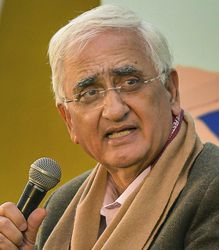My party, the Indian National Congress, like many Indian citizens free of onerous responsibility of managing important diplomatic relations, has closely observed with growing concern the unfolding of the human crisis in Ukraine as a result of military conflict between that country and Russia. Apportioning blame now is neither helpful nor useful in the long run for India to play a constructive role. There is much talk of the emergence of a new world order and it would be a pity if that happens without India’s participation and contribution. Even as our relations with Russia remain important there is great irony in being on the same side as China although our comfort level with the latter remains uncertain.
Sadly, despite efforts on both sides, escalation of the differences has led to avoidable military violence causing loss of life and property. As this opinion is being written, the first round of talks between the estranged neighbours has drawn a blank even on a temporary ceasefire. India finds itself in the unhappy situation of having friends on both sides of the conflict and, therefore, especially distressed that matters got out of hand. Undoubtedly, we have a duty to prevail on both sides and persuade them to de-escalate the conflict immediately and work towards peaceful military disengagement and negotiations.
There is much to be said on both sides and that can only be done by honest intervention of friends. Expectations and the chance of being misunderstood are obviously great. Unfortunately, our voice is somewhat dampened by practical considerations of self-interest and our valued relationship with Russia over the decades and through many crises. That relationship, ironically, was shared by Ukraine as part of the Soviet Union although the latter’s preoccupation with the EU and NATO may have obscured that somewhat. However, the very fact that 20,000 Indians, most of them students, are on Ukrainian soil speaks of our continuing beneficial relationship.
Unfortunately, the fine balancing we need to do in the current circumstances is not exactly helping those Indians caught in the dangerous situation. The government of India must, of course, keep in mind that the commitment of the country over decades since independence from Panchsheel to the Non-Aligned Movement is not hastily undermined by a difficult emotional and practical consideration to support a friend. But then, what is a friend who does not heed the implications of a decision taken in his own legitimate self-interest?
In the last seven years, as we boasted of having taken our international friendships to an unprecedented level, did we take too much for granted? Did the visuals of partnership overlook realpolitik? Did we misread the gestures of friendship and take the surface impressions for the substance of our relationships? Surely, we must do what we can to bring peace immediately but once that is achieved there will be a lot to do for the world and India as well.
Also read
- Who is Denis ‘WhiteRex’ Kapustin? Commander of the Russian Volunteer Corps killed in combat
- Ukraine's special services suspected in car bomb killing of Russian general in Moscow
- The ‘mouse’ that roared continues to be heard: Finland and the Russia-Ukraine war
- The digital kill-chain: Russia's mastery of a critical skill in modern warfare
- Russian cargo plane blacklisted by US lands in South Africa; could it strain Pretoria-Washington relations?
- Trump calls India, China 'primary funders' of Ukraine conflict, demands NATO countries to halt Russian energy purchases
Let us not forget that the strategic force of Russia has been alerted and many have talked of a third world war, even if to discourage the remote possibility. One is reminded of the Cuban crisis when US president John F. Kennedy drew the red line and the USSR retreated, averting a nuclear confrontation. We might be witnessing an obverse mirror image this time, with many allusions to the past arguments we heard from the US. But, this is a solemn reminder that the worst fears of the Cold War days might continue to visit us if we do not put the world in order. There is little one can do about the lives that have been lost, particularly innocent young children and women, the worst victims of state violence. But, there might be a lesson in not permitting disagreements and differences to grow into major confrontations. Sovereignty and security are in a balance; the scales must be held steady without fear or favour on all sides. As an Indian, one can only ask of our government: are you equal to the task?
There is, of course, need during the crisis to support efforts of the government of India to put in place arrangements to evacuate Indian citizens, albeit with considerable, inexplicable delay. In the internet age, the painful helplessness of young Indians stranded without transport and with little back up, and the unfortunate lack of cooperation by border authorities of Ukraine and its neighbours quickly overshadows the uncalled-for celebration for evacuating but a fraction of the Indian population of Ukraine. Yet, hopefully all our citizens will be home soon and one hopes that the government will do a better job of renegotiating their ultimate safe return to their institutions. Simultaneously, the government must exert itself with greater endeavour to have its voice heard to restore peace and, for that extensive diplomatic effort, engage all stakeholders and build enlightened public opinion.
—Khurshid is former external affairs minister.



